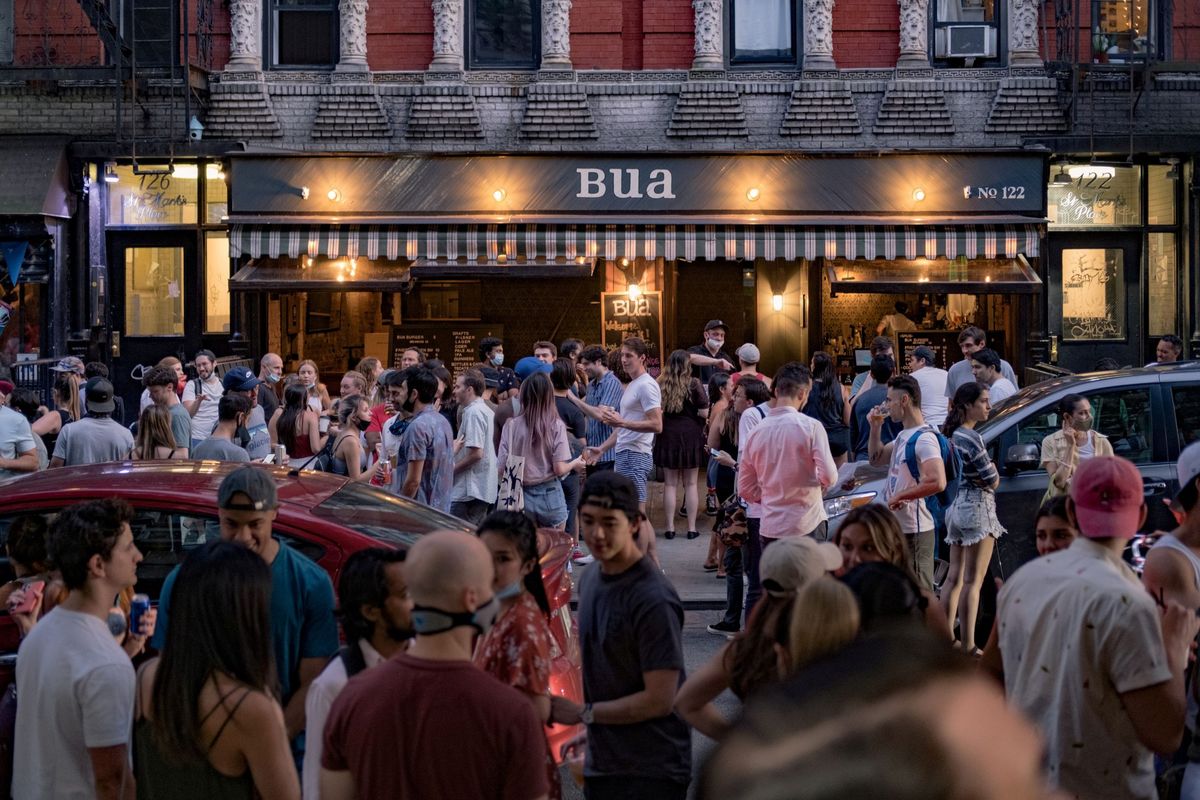The restaurant industry finds an unlikely hero in Guy Fieri, but will it be enough?

A few minutes every morning is all you need.
Stay up to date on the world's Headlines and Human Stories. It's fun, it's factual, it's fluff-free.
A study conducted by One Fair Wage found that 66% of service industry workers who answered their survey reported that their tips have declined by 50%. Two-thirds of workers said they received lower tips after they enforced coronavirus protocols.
Before the pandemic locked most Americans indoors for several months, the bar and restaurant industry employed 15.1 million workers, about 10% of America’s workforce. The pandemic showed Americans just how vulnerable the service economy is and throughout the months of lockdowns, restrictions and closures, many workers in restaurants have struggled to make ends meet.
Financial issues due to lockdown
Government-imposed lockdowns caused intense pressure on the restaurant industry starting in March. Restaurants did what they could to adapt, opening for deliveries and take out, but the industry was still hit hard. Even with looser restrictions like outdoor seating and limited-capacity indoor dining for the last few months, Yelp reported 26,160 restaurant closures, with 15,770 of them permanently closing.
In a letter written to Congress by the National Restaurant Association, their nationwide survey found that 87% of full-service restaurants reported a 36% drop in sales revenue. Compared to the 5%-6% average profit margin, the revenue drop is unsustainable. With coronavirus cases surging throughout America again, these figures are expected to worsen in the coming months.
Lockdowns were especially tough for restaurant workers. The overall unemployment rate peaked at 14.7% in April 2020, with retail and service industries hardest hit.
Isabella Marciante, a bartender at The Polo Club Lounge at the Windsor Court Hotel in New Orleans, told TMS she spent time out of work. “I did receive unemployment insurance, and I was lucky enough to be able to pay all my bills and put some away in savings.” Extra benefits provided by the CARES Act and the Pandemic Emergency Unemployment Act allowed many in the service industry to stay afloat.
Now that restaurants have opened back up, the unemployment rate has gone down to 6.7% in November, still higher than the numbers seen in the pre-COVID days. Even with the reopenings, industry workers are still tight on money. A study conducted by One Fair Wage found that 66% of service industry workers who answered their survey reported that their tips have declined by 50%. Two-thirds of workers said they received lower tips after they enforced coronavirus protocols.
Kyle Patterson, a server at Hapa Sushi in Denver, Colorado, told TMS, “I didn’t struggle to pay bills during the first lockdowns, and I’m still doing OK thanks to some minor savings.”
However, that has changed in the recent months. As Colorado’s coronavirus cases rose steeply in October and November, the state closed indoor seating in restaurants across 15 counties.
“Right now,” Patterson explains, “with Denver’s return to no indoor dining, I’m probably at my lowest point financially during the pandemic. With only takeout and limited outdoor seating, I’ve taken a big hit on hours and income.”
With restrictions in place, despite going back to work, many restaurant and bar staff have reduced hours on top of the poor tipping. Marciante adds, “I’ve only been working 1 or 2 days a week, and if business doesn’t change soon, things might get tight.”
An unlikely hero
Guy Fieri’s claim to fame is his fire-emblazoned bowling shirt, bleached spiky hair and visits to little-known restaurants across the United States for his Food Network show “Diners, Drive-ins, and Dives.” Inspired by these firsthand experiences with restaurant workers and owners, Fieri recognized that the food industry would be one of the worst hit by the pandemic. Fieri – the self-proclaimed “Mayor of Flavortown”– helped raise more than $21.5 million in partnership with the National Restaurant Association Educational Foundation.
Restaurant workers who have lost their jobs or lost wages can apply for grants from the Restaurant Employee Relief Fund for a one-time US$500 grant. 80% of those who received the grant earned a household income of less than US$50,000 before the coronavirus.
Despite Fieri’s help, many believe the government should be doing more to help workers and restaurants. Janice Dean, Fox News meteorologist, tweeted, “@GuyFieri has raised more than $21.5 million in seven weeks to assist unemployed restaurant workers. Shame on every single one of our government ‘leaders’ who have failed them. God bless the ‘Fundraiser of Flavortown.’”
Safety concerns
Restaurant workers who return to their jobs face greater risks in return for lower rewards. The Centers for Disease Control and Prevention (CDC) has found that an adult who contracted the coronavirus was twice as likely to have dined at a restaurant before showing symptoms.
Restaurants are also leaving their workers without the proper safety training and supplies they need.
One Fair Wage found that food service workers have a higher risk of contracting COVID-19, mostly due to the lack of social distancing and masks. Most workers reported being in close-contact with a customer without a mask. 70% have said their employer is not consistently following COVID safety protocols.
Marciante believes her employers are doing the best they can to keep her safe, but the customers are the ones to worry about. “I think my job tries to take as many precautions as they can,” she said, “but the guests can be a bit disagreeable. People usually aren’t on their best behavior after they’ve had a few martinis.”
Patterson believes that despite the issues restaurants and bars are facing today, “the service industry isn’t going anywhere … People love spending money on eating out.”
Have a tip or story? Get in touch with our reporters at tips@themilsource.com




Comments ()